9 min read
How to Get Property Management Clients (Lead Gen Methods)
With such a competitive and fast-paced real estate market, especially rental markets, knowing how to get property management clients is crucial for starting and...

Almost anyone can purchase property – but becoming a landlord takes more than owning a house. You need property management skills that mix business, computer, and people management so that you can keep your occupancy rates high while maintaining strong relationships with your tenants.
This article breaks down the key capabilities you need to thrive as a landlord.
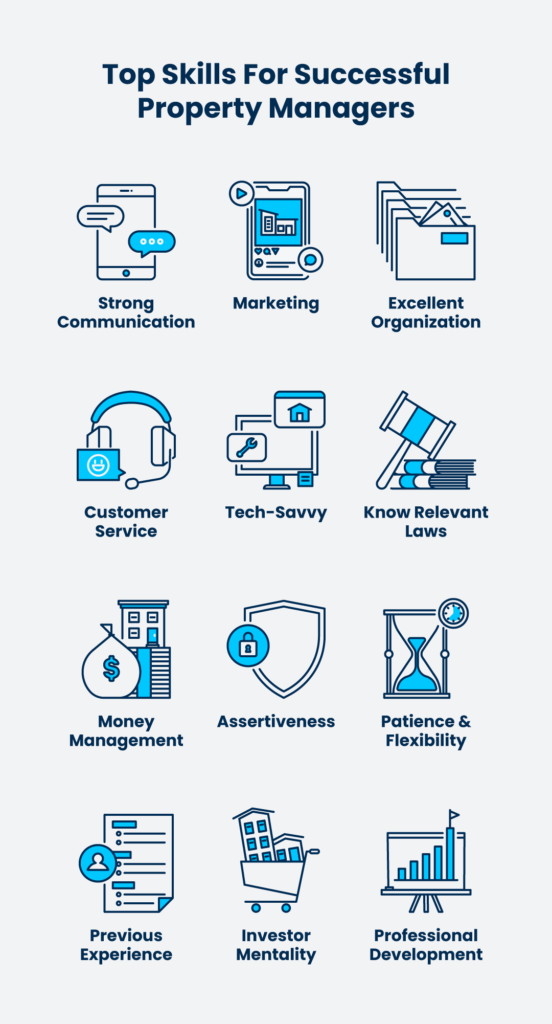
There are various skills and characteristics a property manager needs in order to be successful in the role. We’ll work through each of our top picks below:
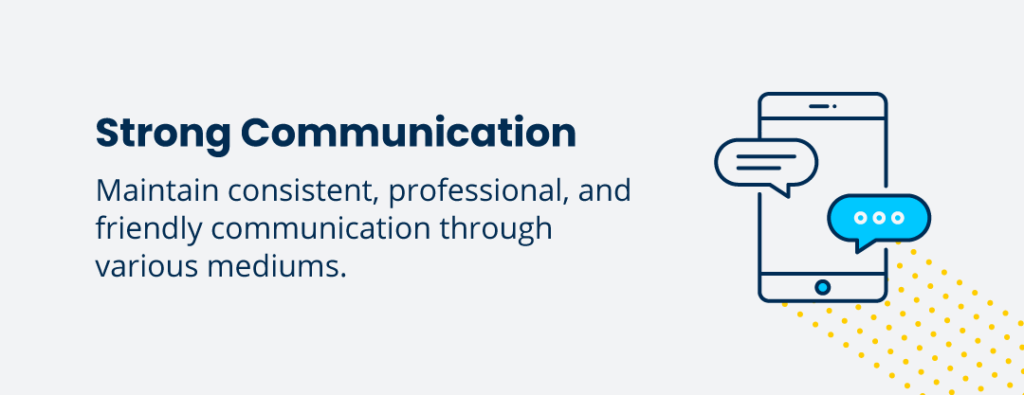
Strong communication skills are key for those looking to profit long-term from rental investments. Landlords communicate regularly with various stakeholders including current tenants, prospective tenants, and potential contractors.
Whether you’re resolving a dispute, dealing with an upset tenant, or marketing a vacant property, being readily available and actively listening will serve you well as a landlord. Aim to provide polite, professional, and friendly communication in every interaction.
Pro Tip:
Don’t make your tenants wait for a response! Set expectations for how they can reach you for various situations, from a casual question to a maintenance emergency, then stick to your word.
Having excellent organizational skills is essential for a landlord. While using an online property management tool can take a load off your plate, you’ll need to use them regularly to stay organized. Documentation is your best friend!
If you have or plan to have multiple rental properties, you also need to be able to plan and coordinate tenant moving days while simultaneously staying on top of rent payments to make sure everything is paid on time. Make sure to keep well-documented records of everything and properly schedule events to avoid any misunderstandings.

Successful landlords and property managers know basic marketing techniques, like writing compelling property descriptions, making creative property tour videos, or using different social media platforms.
Knowing how to market your rental property is an essential property management skill, especially in the digital age. The majority of tenants start their home search online, which means you need to show up there, too. Streamline your marketing process with strategic rental advertising to post your rental on dozens of property listing websites all from one place.
Pro Tip:
Evaluate the local market and utilize marketing techniques such as social media, online listings, word of mouth, and local newspaper ads to reach your next tenant.
If there’s one thing COVID-19 taught us, it’s that just about anything can be done online. Being tech-savvy isn’t just a good property management skill to have, but a necessary one. Knowing how to use online tools makes every part of property management easier.
Real estate has become a digital industry, so landlords need to learn new technological tools to add value and better serve their tenants. From convenient rental documents and forms to online rental payments, knowing how to manage these tasks digitally will add value to your service as a landlord.
Pro Tip:
Stay up to date with new property management tools like online rent and maintenance repair requests to boost your customer experience and competitive advantage.
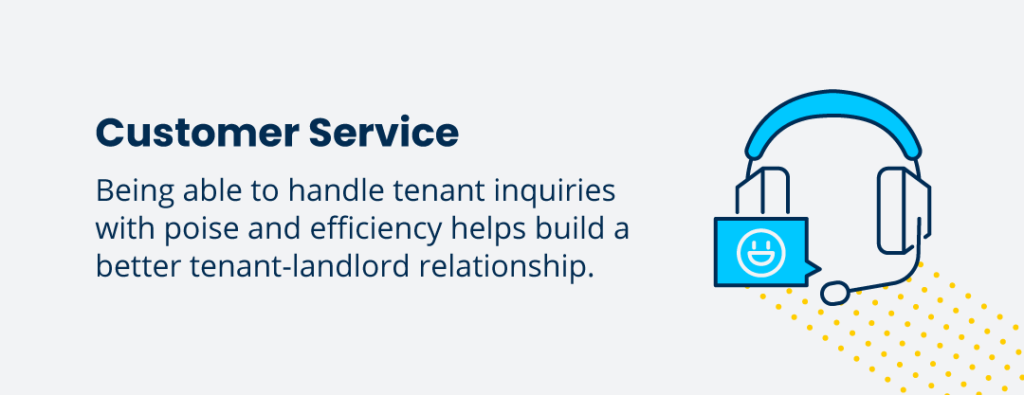
Having hands-on skills like customer service will serve you well as a landlord. Customer service is a highly valued property management skill as landlords, in essence, serve their customers — which are the tenants, in this case!
From general questions to aggravating complaints, handle your tenants’ inquiries with poise, professionalism, and efficiency. Good landlords prioritize their tenants over other responsibilities and, in turn, reap the benefits with better tenant-landlord relationships and increased retention rates.
Pro Tip:
Go above and beyond for your tenants, whether it be making them feel welcome in the neighborhood or resolving any issues as soon as possible.
Imagine getting real estate inquiries from current or prospective tenants and not knowing the answer — that wouldn’t leave a very good impression. Knowing relevant landlord-tenant laws is a fundamental property management skill that every landlord should have, as these rules dictate the terms both parties must comply with when entering into a residential lease agreement.
It’s also important to note that landlord-tenant laws vary between all 50 U.S. states and can change frequently – so make a habit out of rereading your local laws.
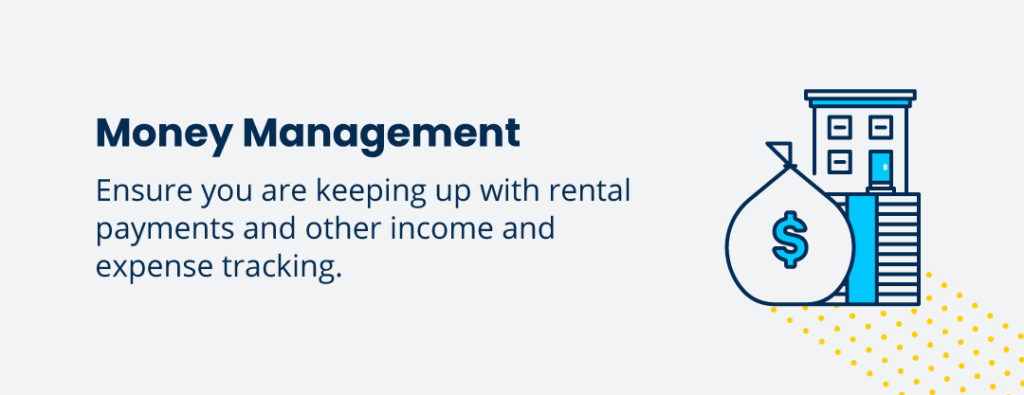
Finance and budget management is an unavoidable property management skill for a landlord. You have accounting responsibilities on top of making sure all your rental payments are being paid fully and on time.
Not only do you have to be organized to keep track of it all, but you also have to stay on top of numbers. Keep your money organized by using an all-in-one property management tool that tracks your expenses, makes it easy to see payment statuses at a glance, and tells tenants when rent is late on your behalf.
In a perfect world, tenants pay their rent exactly when it’s due and there aren’t any issues. Unfortunately, that’s not always the case. Good landlords have to have a lot of patience and flexibility to deal with those testing situations, from tenant complaints to missing rental payments.
It’s also important for a landlord to stay current with the issues happening in the world like natural disasters, pandemics, the state of the economy, etc. Know when to be empathetic and work with your tenants by offering delayed rental payment plans or negotiating rent. Being attentive to your tenants’ needs will help you build trust and respect and decrease tenant turnover.
Pro Tip:
Remaining kind and graceful will help you build a good relationship with your tenants, which typically leads to them complying with your rules and respecting your boundaries.
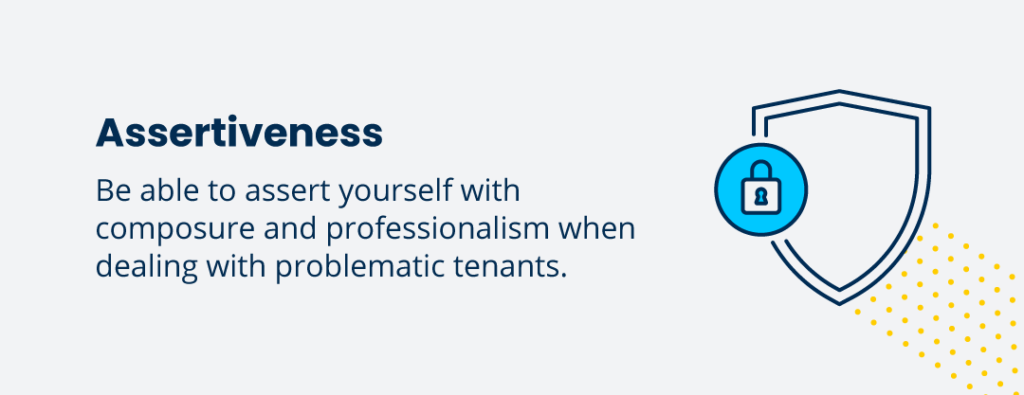
Although patience and flexibility are important, there’s a fine line between being easygoing and being a pushover. Having tough skin and assertiveness is just as important for a landlord to have, as there are times when you’ll have to handle tough situations like demanding late rental payments or evicting problematic tenants.
Even when you find yourself dealing with a troublesome tenant, it’s important not to act on emotions and to display poise, confidence, and professionalism with all communication.
Pro Tip:
Keep a well-organized record of all missing payments, neighbor complaints, and contract breaches to support you in tough situations.
The best way to be a great landlord is to gain experience being one. Although it’s not required, having previous experience will be beneficial to you in the role since there’s a broad range of responsibilities and skills needed to be successful.
While working in a leasing office will help you jumpstart your career in property management, you aren’t limited to apartment complexes or condos. Having experience in a related field like customer service or even building maintenance are all past experiences that’ll be useful to you as a landlord or property manager.
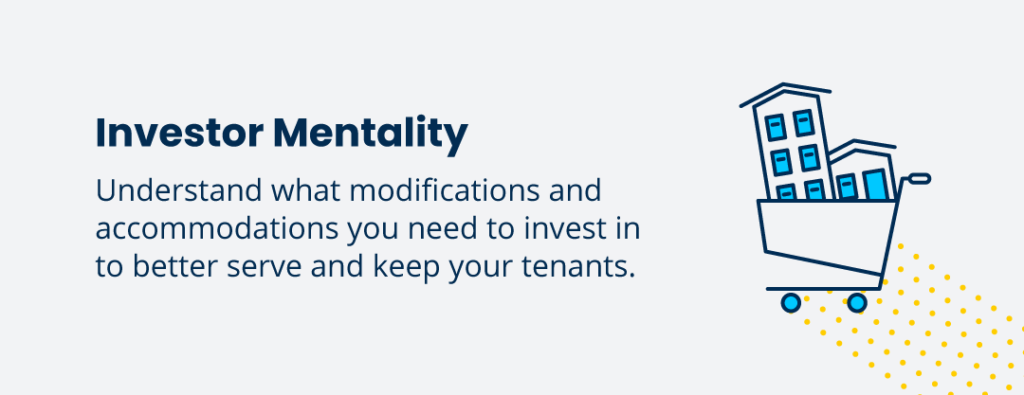
A rental property is an investment, which means the end goal is to make money out of it. As a landlord or property manager, you should understand the area and demographic where you plan to rent, which means you’ll need to know the basic tools to analyze a property – to calculate the ROI on a potential investment, use a free rental property calculator to determine your cap rate, cash-on-cash return, and more.
For instance, if you wish to target eco-friendly tenants, investing in a passive house may be worth it, while fall-proofing your home would work best for a senior rental. If you cultivate an investor mentality, you’ll be able to make important business decisions for your properties that turn a profit at the end of the day.
Pro Tip:
Research to understand the wants and needs of your target demographic for your rentals so you invest in the accommodations necessary for a better competitive advantage.
Real estate is an ever-changing industry. A good landlord or property manager is dedicated to ongoing education which will support and develop all of these property management skills throughout their career.
Gain insights by checking out the latest professional development webinars, newsletters, videos, and other resources to ensure that you are up to date on industry developments and trends.
Pro Tip:
Understand areas of improvement, whether it be industry knowledge, marketing techniques, or human relations, and focus on resources that develop those skills.
A property manager is someone who oversees the day-to-day operations of a rental property. This person is typically hired by a property owner or real estate investor when they are unable or unwilling to manage the property themselves.
The property manager’s responsibilities include direct communication with tenants and property owners, resolving tenant conflicts or complaints, coordinating maintenance requests, collecting and keeping track of rent, advertising and showing vacant rental units, and so on.
Landlords are property owners and managers of their rental property. While landlords have the ability to hire their own property manager, typically a landlord will take on these responsibilities themselves. Property managers act as on-site caretakers of rental space. They are essentially the owner’s eyes and ears on the property, making certain that all issues and responsibilities are being addressed properly and professionally.
Whether you are a current or aspiring landlord, these top 12 property management skills will ensure you are successful in managing your rental properties. A perfect renting process is a two-way street — both landlord and tenants are responsible for their side of the relationship.
9 min read
With such a competitive and fast-paced real estate market, especially rental markets, knowing how to get property management clients is crucial for starting and...
8 min read
Condo property management, on its face, is exactly what it sounds like — overseeing one or many units in a condominium building...
7 min read
Finding the ideal commercial or residential rental property can be challenging for renters, as it may only meet some of their specific...
The All in One Solution for Landlords
Over 550k landlords use TurboTenant to get leads, screen tenants, create leases, and collect rent — all in one place.